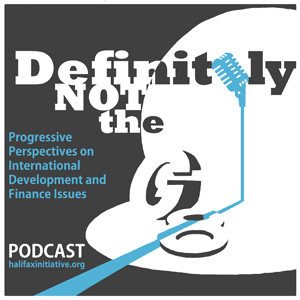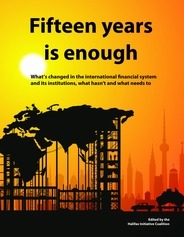The Millennium Development Goals
 |
Final script May 22, 2010; release date June 18, 2010. |
 |
Final script May 22, 2010; release date June 18, 2010. |
Bridge to South KoreaHeld in Toronto, on Monday and Tuesday, June 21-22, 2010, just ahead of the G8 Summit in Huntsville and the G20 Summit in Toronto, this meeting was intended as a strategy session for civil society organizations, platforms and networks from many G20 countries (and beyond) to discuss diverse perspectives on both the G20 as an institution and priorities with respect to its agenda. As the outcome of an initial G20 strategy meeting in Washington DC in April of 2010 among various groups, the intention of this broader meeting of national, regional and international networks was three-fold:
|
MEETING DETAILS
|
Bridge to South KoreaHeld in Toronto, on Monday and Tuesday, June 21-22, 2010, just ahead of the G8 Summit in Huntsville and the G20 Summit in Toronto, this meeting was intended as a strategy session for civil society organizations, platforms and networks from many G20 countries (and beyond) to discuss diverse perspectives on both the G20 as an institution and priorities with respect to its agenda. As the outcome of an initial G20 strategy meeting in Washington DC in April of 2010 among various groups, the intention of this broader meeting of national, regional and international networks was three-fold:
|
MEETING DETAILS
|
Robin Hood Tax: Canada misses a chance for Leadership
OTTAWA – The Canadian Government is missing an historic opportunity to offer constructive global leadership by refusing to consider any kind of levy on the global financial sector.
“There are two proposals on the table here,” said Fraser Reilly-King of the Halifax Initiative. “One would save the banks, the other would save the world. At a time when global poverty is rising, along with sea levels, and European economies are crashing, the Harper government is actively campaigning against both.”
A Bank Tax would apply broadly and ensure future bailout funds would come from banks themselves, not the public. Canada’s counterproposal involves “embedded contingent capital,” which would shift the burden to shareholders, turning [contingent] bonds to equity if the banks run into trouble.
2010 G8/G20 Canadian Civil Society Coordinating Committee
Parliamentary Roundtables on the G8/G20 Agendas
Monday, April 26th, 2010 5:00 pm - 7:00 pm Room 2-2, National Press Building, 165 Sparks Street, Ottawa
2010 G8/G20 Canadian Civil Society Coordinating Committee
Parliamentary Roundtables on the G8/G20 Agendas
Tuesday, April 27th, 2010
9:00 am - 11:00 am
Room 2-2, National Press Building, 165 Sparks Street, Ottawa
 What’s changed in the international financial system and its institutions, what hasn’t and what needs to
What’s changed in the international financial system and its institutions, what hasn’t and what needs toExecutive Summary
Back in 1995, the G7 met in Halifax during a “time of change and opportunity.” The meeting took place in a context of mounting deficits and debt crises in countries in the South; in the wake of economic collapse in Mexico; and amid strong global criticism from civil society, the media and governments about the World Bank and International Monetary Fund’s (IMF) austere neo-liberal structural adjustment policies.
A lot has changed since then, partly in response to the Halifax G7 Summit and subsequent G7 and G8 meetings. Too many of these improvements, however, exist only on paper. Beyond the surface, the neo-liberal, market-oriented bias that guides the Bank and Fund’s agenda and thinking has not altered.
The 2010 G8 Summit in Toronto in 2010 takes place during another “time of change and opportunity.” The financial crisis has spurred many civil society organizations (CSOs) to insist on far-reaching changes to the global financial system and its institutions. Clearly, as this publication will illustrate, 15 years of refusing to deal with the manifest shortcomings of the global economic system is enough.
In "Alternatives", April 1, 2010
http://www.alterinter.org/article3457.html?lang=en
T-A-X. Such a simple three letter word, and yet it elicits responses from people out of all proportion to its size. Perhaps it isn’t surprising. Taxes are scary.
But let’s not forget, as much as you may hate them, without them, we wouldn’t have public health care, education, infrastructure, police and ambulances, government, politicians…(OK, maybe scratch that one). You get the idea. Boring and controversial as they are, taxes are essential.
Three ways to pay for aid commitments
EMBASSY – Canada’s Foreign Policy Newspaper
Wednesday, February 3, 2010
Stephen Harper’s announcement that child and maternal health will be the signature theme of June’s G8 meeting is certainly timely.
Every day 1,400 women die of pregnancy-related causes. Every day 24,000 children under the age of five die of what are largely preventable causes. Progress on improving child and maternal health is the furthest off-track of the eight Millennium Development Goals (MDGs) UN member states committed to in 2000. This focus gives MDGs four and five, on child and maternal health, the push they need ahead of September’s United Nations High Level Meeting and ten year review of the MDGs.
But funding the initiative comes during difficult days – a global crisis and a budget deficit. Resources are tight.
Rethinking the international financial system during a time of crisis
Introduction
On October 19 and 20, 2009, the Halifax Initiative held a conference, co-hosted by The North South Institute, the University of Ottawa and the School of International Development and Global Studies (SIDGS), entitled "What’s Missing in the Response to the Global Financial Crisis?" The meeting brought together experts from a range of backgrounds to analyze the challenges facing the global economy, discuss the ways in which the international community has responded to the current financial crisis, and identify shortcomings in these responses.
| Hon. James Flaherty Minister of Finance Department of Finance Canada 140 O’Connor Street Ottawa, ON K1A 0G5 |
Hon. Lawrence Cannon Minister of Foreign Affairs Foreign Affairs and International Trade Canada 125 Sussex Drive Ottawa, ON K1A 0G2 |
1st February 2010
Ref: Immediate debt cancellation for Haiti
Dear Ministers Flaherty and Cannon,
We are writing to commend the government’s efforts to date to mobilise emergency assistance for disaster relief in Haiti and for speaking to the urgency and importance of debt cancellation for the country. The call to cancel Haiti’s remaining multilateral debt, including last week’s highly concessional $102 million loan from the IMF, benefits from a strong Canadian voice. We urge you to keep demonstrating such leadership in the government’s interventions at the Bretton Woods Institutions, and at Haiti’s largest multilateral creditor, the Inter-American Development Bank (IDB).